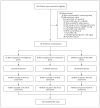CPAP, weight loss, or both for obstructive sleep apnea
- PMID: 24918371
- PMCID: PMC4138510
- DOI: 10.1056/NEJMoa1306187
CPAP, weight loss, or both for obstructive sleep apnea
Abstract
Background: Obesity and obstructive sleep apnea tend to coexist and are associated with inflammation, insulin resistance, dyslipidemia, and high blood pressure, but their causal relation to these abnormalities is unclear.
Methods: We randomly assigned 181 patients with obesity, moderate-to-severe obstructive sleep apnea, and serum levels of C-reactive protein (CRP) greater than 1.0 mg per liter to receive treatment with continuous positive airway pressure (CPAP), a weight-loss intervention, or CPAP plus a weight-loss intervention for 24 weeks. We assessed the incremental effect of the combined interventions over each one alone on the CRP level (the primary end point), insulin sensitivity, lipid levels, and blood pressure.
Results: Among the 146 participants for whom there were follow-up data, those assigned to weight loss only and those assigned to the combined interventions had reductions in CRP levels, insulin resistance, and serum triglyceride levels. None of these changes were observed in the group receiving CPAP alone. Blood pressure was reduced in all three groups. No significant incremental effect on CRP levels was found for the combined interventions as compared with either weight loss or CPAP alone. Reductions in insulin resistance and serum triglyceride levels were greater in the combined-intervention group than in the group receiving CPAP only, but there were no significant differences in these values between the combined-intervention group and the weight-loss group. In per-protocol analyses, which included 90 participants who met prespecified criteria for adherence, the combined interventions resulted in a larger reduction in systolic blood pressure and mean arterial pressure than did either CPAP or weight loss alone.
Conclusions: In adults with obesity and obstructive sleep apnea, CPAP combined with a weight-loss intervention did not reduce CRP levels more than either intervention alone. In secondary analyses, weight loss provided an incremental reduction in insulin resistance and serum triglyceride levels when combined with CPAP. In addition, adherence to a regimen of weight loss and CPAP may result in incremental reductions in blood pressure as compared with either intervention alone. (Funded by the National Heart, Lung, and Blood Institute; ClinicalTrials.gov number, NCT0371293 .).
Trial registration: ClinicalTrials.gov NCT00371293 NCT00371293.
Figures



Comment in
-
Cardiovascular morbidity and obstructive sleep apnea.N Engl J Med. 2014 Jun 12;370(24):2339-41. doi: 10.1056/NEJMe1404501. N Engl J Med. 2014. PMID: 24918377 No abstract available.
-
Obesity: CPAP effects in sleep apnoea-what should be expected?Nat Rev Endocrinol. 2014 Sep;10(9):517-9. doi: 10.1038/nrendo.2014.131. Epub 2014 Aug 5. Nat Rev Endocrinol. 2014. PMID: 25091728
-
Effects of CPAP and weight loss on OSA outcomes.J Clin Sleep Med. 2014 Dec 15;10(12):1365-7. doi: 10.5664/jcsm.4308. J Clin Sleep Med. 2014. PMID: 25405486 Free PMC article. No abstract available.
-
Continuous positive airway pressure plus weight loss for obstructive sleep apnea (OSA), association of cancer with OSA, and hypoglossal nerve stimulation for OSA treatment.Am J Respir Crit Care Med. 2015 Apr 1;191(7):845-7. doi: 10.1164/rccm.201412-2287RR. Am J Respir Crit Care Med. 2015. PMID: 25830519 No abstract available.
References
-
- Young T, Palta M, Dempsey J, Skatrud J, Weber S, Badr S. The occurrence of sleep-disordered breathing among middle-aged adults. N Engl J Med. 1993;328:1230–5. - PubMed
-
- Ip MS, Lam B, Ng MM, Lam WK, Tsang KW, Lam KS. Obstructive sleep apnea is independently associated with insulin resistance. Am J Respir Crit Care Med. 2002;165:670–6. - PubMed
-
- Nieto FJ, Young TB, Lind BK, et al. Association of sleep-disordered breathing, sleep apnea, and hypertension in a large community-based study: Sleep Heart Health Study. JAMA. 2000;283:1829–36. Erratum, JAMA 2002;288:1985. - PubMed
-
- Shamsuzzaman AS, Winnicki M, Lanfranchi P, et al. Elevated C-reactive protein in patients with obstructive sleep apnea. Circulation. 2002;105:2462–4. - PubMed
-
- Malhotra A, White DP. Obstructive sleep apnoea. Lancet. 2002;360:237–45. - PubMed
Publication types
MeSH terms
Substances
Associated data
Grants and funding
LinkOut - more resources
Full Text Sources
Other Literature Sources
Medical
Research Materials
Miscellaneous
